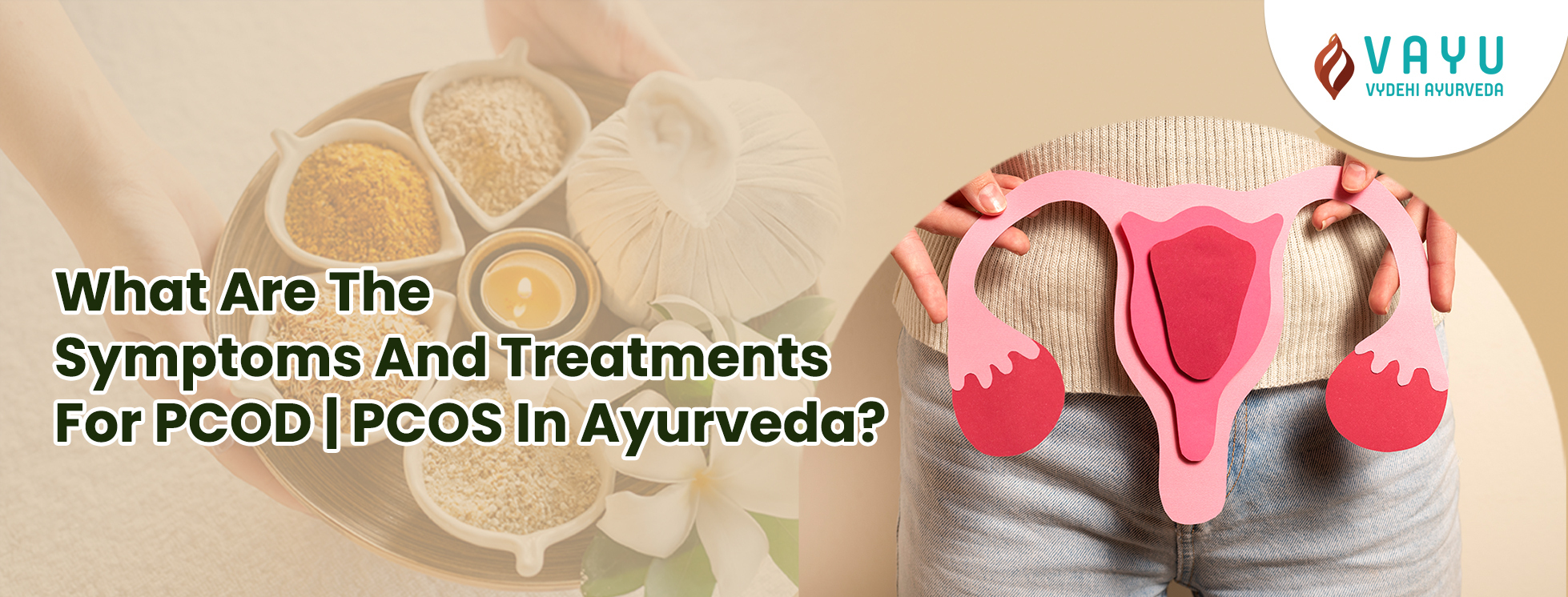PCOS, or Polycystic Ovary Syndrome, is a hormonal disorder that affects people with ovaries, typically during their reproductive years. It is characterized by a combination of symptoms, including irregular menstrual cycles, high levels of androgens (male hormones) such as testosterone, and multiple small cysts on the ovaries.
The exact cause of PCOS is not fully understood, but it is believed to involve a combination of genetic and environmental factors. Insulin resistance and hormonal imbalances are also thought to play significant roles in the development of PCOS.
What are the symptoms and treatments for PCOD/PCOS in Ayurveda?
Signs and Symptoms:
PCOS manifests with various symptoms, which can differ among individuals. Common features include:
Menstrual irregularities: Infrequent periods, missed periods, or very light periods.
Infertility: Difficulty conceiving due to irregular ovulation.
Excess hair growth: On the face, chest, belly, or upper thighs – a condition called hirsutism.
Acne or oily skin: Often occurring on the face, chest, and upper back.
Male-pattern baldness or thinning hair.
Weight gain, especially around the waist (abdomen).
Skin tags: Small pieces of excess skin on the neck or armpits.
Dark or thick skin patches on the back of the neck, in the armpits, and under the breasts.
Increased sensitivity to insulin, resulting in high insulin levels and possibly type 2 diabetes.
High levels of androgens, which can lead to mood disorders, irritability, and depression.
Causes:
The specific cause(s) of PCOS remain unclear; however, several factors contribute to its development:
Insulin resistance – this leads to elevated levels of insulin, causing the ovaries to produce more male sex hormones (androgens). High insulin levels also make it difficult for cells to use glucose effectively.
Genetics – some studies suggest a genetic component contributing to PCOS.
Low-grade inflammation – chronic low-level inflammation might play a role in developing PCOS.
Diagnostic Criteria:
To diagnose PCOS, healthcare providers look for at least two out of three key characteristics:Infrequent, irregular, or no menstrual periods (oligo-ovulation or amenorrhea).
Elevated levels of androgens, such as testosterone, leading to physical signs like excessive facial and body hair (hirsutism).
Presence of multiple small cysts in the ovaries visible during ultrasound examination.
Treatments:
Here is a more detailed elaboration on the effects of Polycystic Ovary Syndrome (PCOS) on the body:
Menstrual Irregularities: PCOS disrupts the normal hormonal balance required for regular menstrual cycles. This can result in irregular periods, infrequent ovulation, and sometimes amenorrhea (absence of menstruation). The lack of predictable ovulation can affect fertility and increase the risk of endometrial hyperplasia.
Hormonal Imbalances: Elevated levels of androgens, such as testosterone, are common in PCOS. This hormonal imbalance can lead to symptoms like hirsutism (excessive hair growth), acne, and male-pattern baldness. Insulin resistance is also prevalent in PCOS, contributing to increased insulin levels and potentially leading to metabolic issues like weight gain and type 2 diabetes.
Infertility: Irregular ovulation or lack of ovulation can make it challenging for women with PCOS to conceive. The hormonal imbalances and disrupted menstrual cycles associated with PCOS can hinder natural conception. Fertility treatments may be necessary for those trying to get pregnant.
Weight Gain and Difficulty Losing Weight: Insulin resistance in PCOS can lead to weight gain, particularly around the abdomen. Difficulty losing weight is common due to metabolic issues and hormonal imbalances. Excess weight can exacerbate symptoms of PCOS and increase the risk of other health conditions.
Skin and Hair Issues: Androgen excess in PCOS can manifest as acne, oily skin, hirsutism (excessive hair growth on the face, chest, or back), and alopecia (hair thinning or male-pattern baldness). These symptoms can have a significant impact on self-esteem and quality of life.
Mood Disorders: Women with PCOS are at a higher risk of experiencing mood disorders such as depression, anxiety, and mood swings. The hormonal fluctuations, physical symptoms, and challenges associated with PCOS can contribute to emotional distress.
At VAYU, we specialize in holistic Ayurvedic treatments for Polycystic Ovary Syndrome (PCOS) and Polycystic Ovary Disease (PCOD), addressing the root cause of the condition for lasting relief and well-being. Our approach focuses on:
Balancing Doshas: Using herbs like Ashoka, Dashamoola, Ashwagandha, and Shatavari to correct hormonal imbalances and restore harmony in the body.
Herbal Remedies: Utilizing Ashwagandha, Turmeric, Shatavari, and other herbs to regulate hormones and manage PCOS symptoms effectively.
Dietary Changes: Recommending dietary modifications to limit dairy, avoid certain foods, and emphasize fruits to support treatment efficacy.
Lifestyle Modifications: Encouraging an active lifestyle with Yoga, meditation, and avoiding smoking and alcohol to regulate hormonal levels.
Panchakarma Therapy: Offering effective treatments like Basti to balance Vata Dosha, regulate ovulation, and manage PCOS effectively.
Experience the comprehensive approach of Ayurveda at VAYU, where we prioritize restoring balance in the body and promoting overall well-being for our patients.
